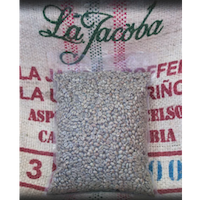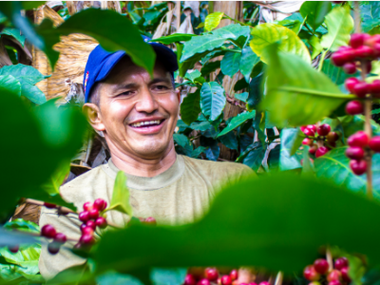Columbian Coffee Farming (& introducing our awesome Columbian SR, Micro Lot, La Jacoba beans)
Posted by Mark Bentham, The Coffee Man on 12th Mar 2019
Fancy getting to know a bit
more about an amazing Fairtrade coffee we use? Interested in the Columbian
coffee farmers and the cooperatives who encourage better lives for farmers
through sustainable practices?
Ever wanted to try the famous Columbian coffee and want to talk about coffee
characteristics?
We would like to introduce one of our greatest single origin beans to you . We buy a stunning Columbian coffee direct off the farmers family Co-Op in La Union, Columbia.
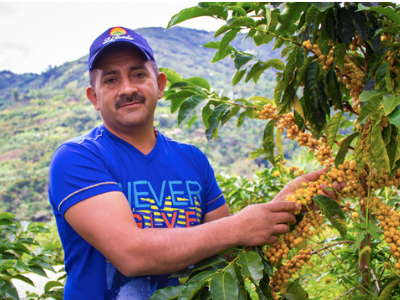
Columbian SR Micro Lot, La Jacoba
This Columbian coffee bean is grown in a crop is located North of the department of Nariño, southern Colombia, in the municipality of La Union. It is grown in the beautiful volcanic soil of the Macizo Colombiano. The soil, or Terra Rossa, as we call it in the wine and coffee game, is one of the reasons that a special character permeates this coffee.

Kimberley Coffee Company has set up a direct relationship with this community located in Southern Colombia and we source these beans directly from the community, therefore assuring more money goes to the very people that grow the crop. In addition to this, we cooperate under the Fairtrade global system with this arrangement to make sure that transparency is upheld by a third party in our transactions with the farm.
We urge you to try this outstanding coffee and support this community, and share our passion for Fairtrade practices and sustainability.
ASPROUNION Family Members
ASPROUNION is a cooperative of farmers and coffee producers based out of the town of La Union in southern Colombia. Coffee is grown on the slopes of Mount La Jacoba in the fertile volcanic soil. Established in 2001, ASPROUNION has since worked on improving the quality of life of the 273 associated families. The farmers are mainly small-scale coffee producers located in the locality of La Union, of the Narino Department in southern Colombia. With the support of government and industry partners and the commitment of the families, ASPROUNION seeks real solutions to the problems of poverty, economic insecurity, and drug cash-crops, by producing coffee and value-adding via processing and marketing done within the organisation.
The coffee produced by ASPROUNION farmers is considered by national and international experts (including the SCAA: Speciality Coffee Association of America) to be high-quality specialty coffee. The particular climatic and geographic conditions of La Union locality, along with the traditional practices at cultivation, harvesting and post-harvesting stages, combine to produce a unique coffee with exceptional physical and sensory characteristics.
For ASPROUNION and its members, it is vital to participate effectively in all value-adding processes, and thus provide better returns for the producers, to guarantee economic, social and sound environmental development for the whole community.
Thanks to the vision and community involvement of ASPROUNION partner families, they have managed to develop value-adding to their own product. They now have management, processing, and sales in the hands of partners and their family members, who demonstrate a professional commitment to offer freshly roasted high-quality coffee, under strict rules of best practice in both agriculture (BPA) and manufacturing (BPM), while ensuring the traceability of the product.
What does the coffee farmer do?
The production process is done with great care by Columbian family members because their small farm is their source of livelihood so they have all the responsibility and commitment involved with taking care of every part of the process. This family knows and understands (thanks to the assistance and support of ASPROUNION) the importance of a rigorous manner to maintain traceability, but with environmental responsibility. Therefore, besides producing a coffee of exceptional characteristics, the farmers also conserve the biodiversity of water and soil; and preserve the balance of the planet.
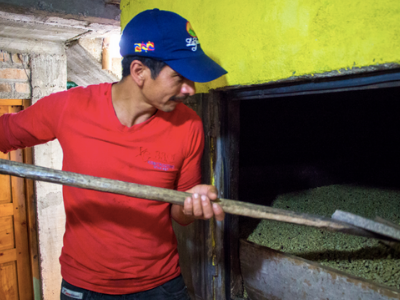
We know Organic is the best coffee to drink. At the farm, everything starts by applying clean craft production practices, under the shade of native trees and tropical fruit. A regulated environment for the development of the coffee plant is generated, therefore adding organic matter to the soil, water in summer and drainage in the rain, allowing vigorous seedling development and a healthy cherry. At the time of harvest, carefully selected cherries that have reached their optimum level of maturity are pulped and benefit from manual wet processing using natural water sources and are finally dried under free exposure to sunlight. The resulting coffee parchment is transported to the collection point provided by ASPROUNION.
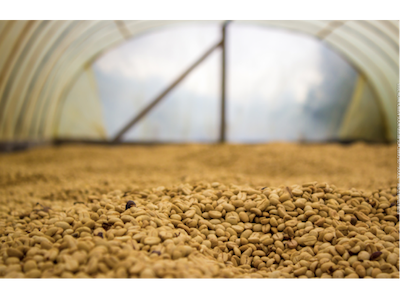
Once at the point of collection, the sample’s code is allocated and carrying a physical and organoleptic* evaluation is taken; physics is done via an on-site collection and set the price to pay also gives the first hints of coffee quality. Meanwhile, sensory analysis is performed on the same sample in laboratory quality control by a tasting panel comprised of eight tasters.
In case you are wondering what that impressive word above means, organoleptic is :
1: being, affecting, or relating to qualities (such as taste, colour, odour, and
feel) of a substance (such as a food or drug) that stimulate the sense organs.
2: involving the use of the sense organs organoleptic evaluation of
foods.
The final high score for the humble La Jacoba Coffee comes only after a rigorous qualification process and testing by a demanding panel of tasters. The resulting coffee bean that we buy green, then roast by hand, tradition, boasts not only excellent flavours and aromas but is ingrained with the culture, the history and the passion from each family. We think you can taste the love!
More about the coffee…
The "La Jacoba" coffee from Union in Narino, Columbia, is cultivated with great care by small-scale farmers and their families. The farmers use a traditional artisan practice of chemical-free plant growth, under the shade of the native tropical canopy. Following the natural rhythms of the various plants, mature berries are hand-picked all year-round, soaked with mountain-sourced water to remove skins, and the beans are sun-dried. The high quality of the Special Reserve coffee is ensured, from the choice of the best red berries to the quality control of the final product. This careful production process ensures a low environmental impact and a reliable sustainable supply, in harmony with nature.
This bean is classed as a ‘Micro Lot’ bean.
When we talk about ‘Micro Lot’ produce, we really mean The Best of The Best. Imagine that there a the coffee plantation that produces all the same types of coffee berries from the same type of coffee trees. But one particular part of the farm seems to have the a superior combination of altitude, weather and soil that makes the produce just outstanding. In the coffee world, the beans from this particular plot of land are graded 84+. That’s GOOD!
The coffee farmer sees how amazing this particular plot produce is and chooses to fence it off, pay special attention to its water and nutrients, and processes it with a little extra care, keeping it separate from the rest of their beans.
This is a Micro Plot.
The coffee that is the product of this passion and care combines a delicious acidity, caramel sweetness and smoothness like no other.
Aromas are tangerine, sugarcane, and grapefruit. Flavours are citric and soft. The aftertaste is pleasant. The coffee brings a medium brightness in colour and it has a consistent, juicy body.
La Jacoba coffee stimulates your senses and comforts your soul. Check out our freshly roasted Columbian SR Micro Lot La Jacoba single origin, Fairtrade and organic beans online now.
